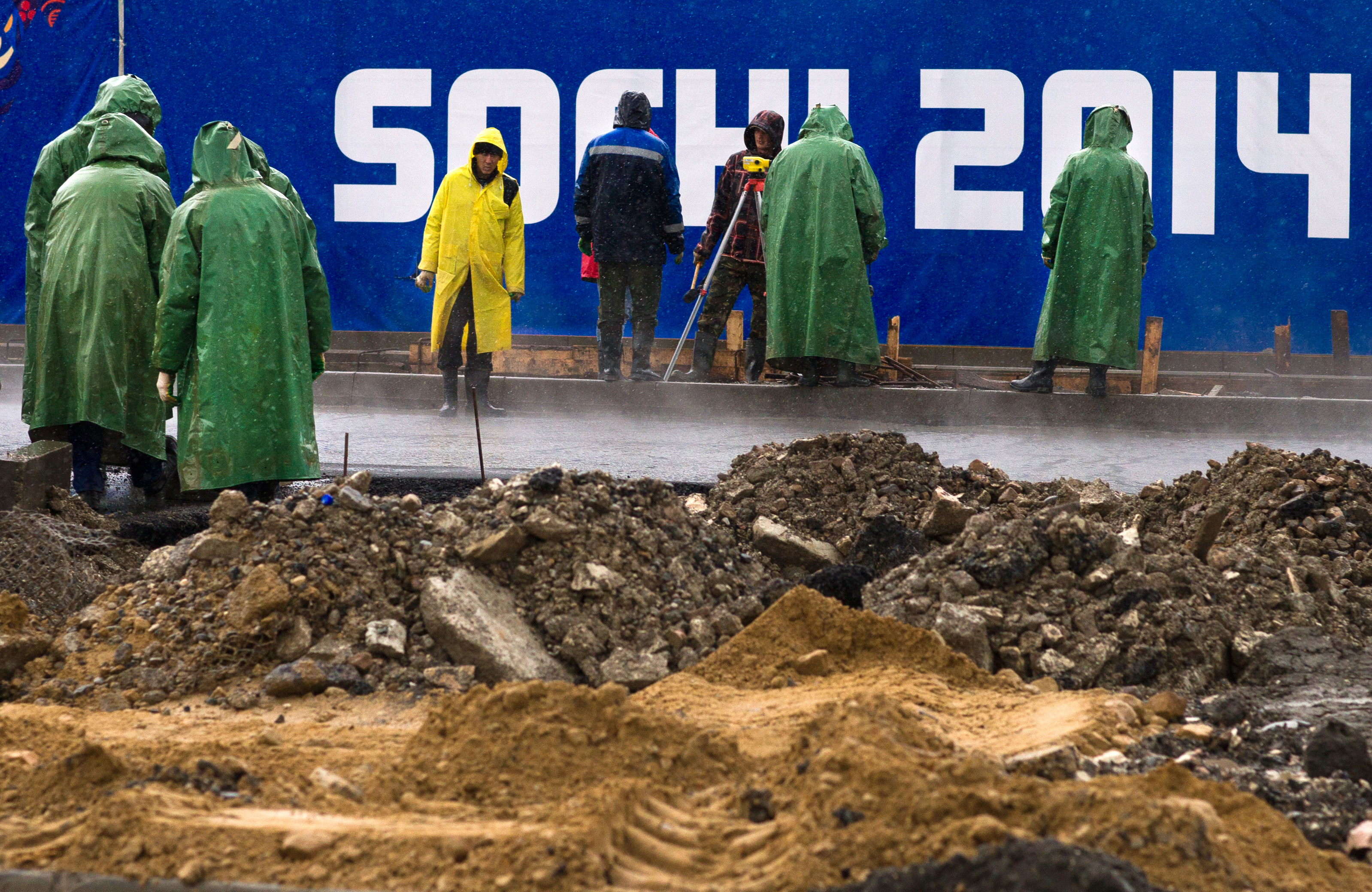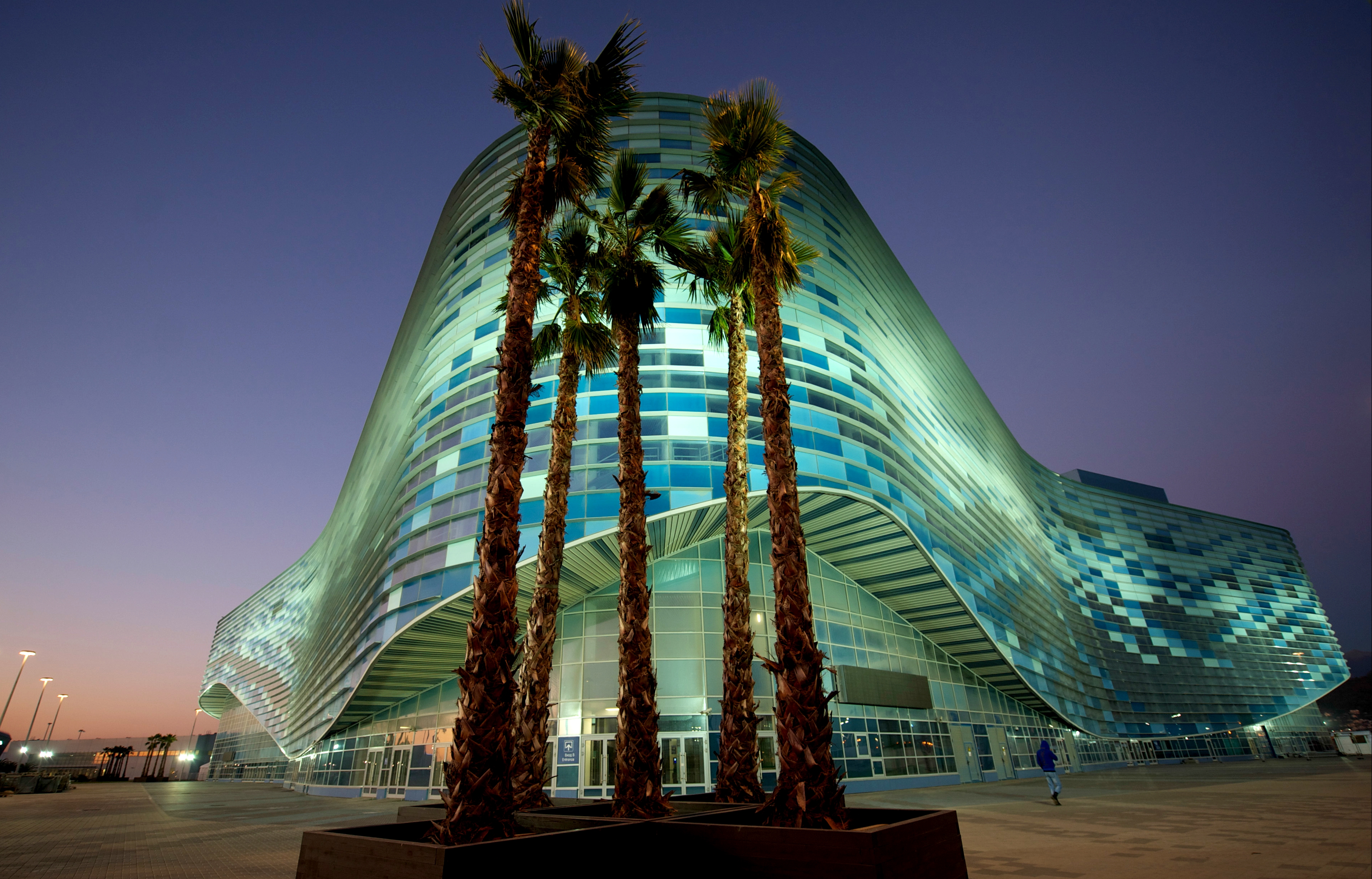Sochi: resort or eternal building site?

Even before the start of the Winter Olympics, there has been no shortage of words written about Sochi in the Russian and in foreign press. But when you get there, it is immediately clear that one of the main issues is the violation of construction workers’ rights.
The Olympic Games in Sochi promise to be the most compact ever – or at least, that is what the organisers are saying. It is compact in that it consists of two clusters: one on the coast and one in the mountains, where the main venues have been built.
Holding the Olympics in Sochi is part of the overall goal of developing the city as a resort.
In 2007, the government adopted a “Programme for the construction of Olympic facilities and for the development of Sochi as a mountain resort”, which envisages the construction of 206 sites, including 30 for sporting competitions.
The others are part of the engineering and tourism infrastructure. All of this has changed the city’s economy and created new jobs. Sochi has attracted workers from other parts of Russia and from abroad.
In Russia, Sochi is traditionally seen as a wealthy city, but is that really the case? It has the same problems as the rest of the country: low wages, high prices, crumbling public facilities, poor roads. It is now six years since implementation of the ambitious Olympic plans got underway.
Of course it is not easy to live with constant construction work going on. But noise and dirt are not the only problems: another is the failure to pay the wages of construction workers.
The organising committee was set up on October 2, 2007. Its founders include the Russian Olympic Committee and the Ministry of Sport, Tourism and Youth of the Russian Federation. The venues are spread over two sites, or clusters.
The “mountain cluster” in Krasnaya Polyana includes the skiing areas, the bobsleigh, luge and skeleton track, the Olympic mountain village and hotels. By the new railway it takes only an hour to get to the Olympic Park.
The “shore” cluster, which is cut off from the sea by a mesh fence, contains several ice rinks and an ultra-modern media centre, which the organisers say is seven times bigger than Red Square in Moscow.
It is also the site of the main Olympic village, whose flats will be sold or put out to rent after the Games.
Violations of rights
Workers’ rights are being violated and “failure to pay construction workers their wages is widespread”, according to Semyon Simonov, the coordinator of the “Migration and law” centre in Sochi.
There are other frequent violations of the law as well, such as an absence of contracts with subcontractors or even of labour contracts.
Against this background, the story of Robert Kesyan, a graduate in municipal engineering from Sochi University, hardly seems anything out of the ordinary. Since August 2012 he has been employed by the Q-tec company that constructed hotels for Olympic visitors in the Imeretin Valley (in the coastal cluster). In November 2012 he was made chief engineer of the technical support department.
Workers on the Olympic construction sites, particularly migrants, are often taken on without proper contracts, but Kesyan comes from Sochi and was employed in accordance with all the rules of Russian labour legislation. But he says that his department, which has seven engineers and about 100 workers, has not been paid since July 2013.

More
The Winter Olympics under Sochi’s palm trees
No demonstrations
It didn’t take them long to discover that failure to pay wages was not the only major problem: the workers’ employment record books turned out to be in the company’s Moscow office – and without that, it’s impossible to get a decent job. Some of Kesyan’s colleagues have come from other parts of Russia and now they are unable even to buy their ticket home.
They have taken their case to the prosecutor’s office but have not yet received an answer. What’s more, people are not allowed to hold rallies or put up picket lines because that could lead to unrest, something punishable by a prison sentence in Sochi in the run-up to the Olympics.
Simonov told swissinfo.ch that he had received some 90 complaints about unpaid wages. His organisation has been working in the region since July 2012.
The international NGO Human Rights Watch (HRW) used the centre’s data as the basis for its report on violations of labour legislation in the construction of Olympic venues. It’s thanks to journalists and the public that the problem is now being discussed, Simonov believes.
“The situation has changed a little qualitatively; at least the authorities recognise that the problem exists,” he said.
HRW published its report Race to the Bottom: Exploitation of Migrant Workers Ahead of Russia’s 2014 Winter Olympic Games in Sochi in February. It says that guest workers in Sochi have been cheated by employers. They usually had to work 12-hour days, were not given days off, were often not paid the agree wage, and when they attempted to demand their rights were simply expelled from the country.
The report is based on interviews with nearly 70 migrant labourers working on Olympic and other sites in Sochi between 2009 and 2012.
They were citizens of Armenia, Kyrgyzstan, Serbia, Tajikistan, Uzbekistan and Ukraine. Nearly all of them had had low-wage, low-skilled jobs. They claimed they were usually paid between 55 and 80 roubles ($1.80- 2.50) per hour.
HRW report
HRW published its report Race to the Bottom: Exploitation of Migrant Workers Ahead of Russia’s 2014 Winter Olympic Games in Sochi on February 6.
In addition to delays in wages or their non-payment altogether, it lists such widespread violations as the 12-hour working day and the fact that in many cases employers are withholding workers’ personal identity documents.
The report is based on interviews with 66 migrant construction workers which HRW conducted at some of the key Olympic sites: the central stadium, the main Olympic village and the main media centre.
Konstantin Romodanovsky, head of the Federal Migration Service, responded by telling the Interfax news agency that the HRW report had blown the situation “out of proportion” and that he considered the way it had presented it to be “wrong and dishonest”.
His office was monitoring the situation very attentively, he said. He admitted that there might have been isolated mishaps and complications, but said the authorities had not received any serious complaints and there was no indication of large-scale delays in paying wages at the Olympic sites.
The newspaper Vedomosti claims that the total cost of preparing for the Sochi Olympics has already exceeded 1.5 trillion roubles (CHF40 billion), five times more than the initial estimates of 315 billion.
The XXII Winter Olympics will be held in Sochi from February 7-23, 2014, and the Paralympics from March 7-16.
11 new world-class sports venues have been built in Sochi, with total seating for about 120,000.
There will be 98 sets of medals awarded for seven Olympic disciplines.
Sochi will host 6,000 Olympic sportsmen and women and members of Olympic teams (coaches, doctors, etc).
The Games will be supported by 25,000 volunteers.
About 13,000 journalists and photographers will be accredited to the Games.
About three billion people are expected to watch the Games on television.
(Translated from Russian by Julia Slater)

In compliance with the JTI standards
More: SWI swissinfo.ch certified by the Journalism Trust Initiative
You can find an overview of ongoing debates with our journalists here. Please join us!
If you want to start a conversation about a topic raised in this article or want to report factual errors, email us at english@swissinfo.ch.